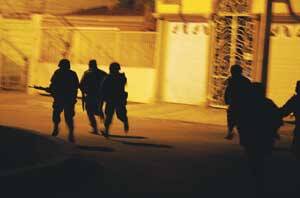The Bishops’ Conference of Mexico has released a pastoral letter calling on the Mexican government to reconsider its force-reliant strategy in combating powerful narcotics trafficking cartels even as it asks the government to respond to a wave of violence that has claimed more than 18,000 lives over the past three years. “Security is not directly or principally related to the ability to use force, the number of police officers, the degree of militarization or the purchasing of weapons,” Mexico’s bishops wrote. “With the passage of time, the participation of the armed forces in the fight against organized crime has provoked uncertainty in the population.... It is very clear this environment of violence and insecurity in which we are living denotes a sense of the loss of God.”
Mexico has been involved in a crackdown on narcotics trafficking cartels that have been fighting turf wars over lucrative smuggling routes into the United States and fomenting an increase in addictions at home by developing domestic markets for drugs. The federal government has dispatched more than 40,000 soldiers and federal police officers to battle the cartels in regions like Chihuahua in northern Mexico, Sinaloa on the Pacific Coast and Michoacan to the west of Mexico City, but results have been mixed. Public support for the campaign appears to be declining.
Violence has not decreased in many of the states where the cartels have been most active over the past three years. Ciudad Juárez, which neighbors El Paso, Tex., has been the scene of mass slayings—like the Jan. 31 shooting of at least 16 young people at a birthday party. New problems also have emerged during the military response: an increase in allegations of human rights abuses against the military and evidence that the cartels have diversified into such other illegal activities as piracy, extortion and kidnapping. Sixty percent of respondents in a survey released Feb. 15 by the Mexico City polling firm Buendia y Laredo said violence had increased over the past six months, and 56 percent of respondents said the federal government’s crackdown on narcotics trafficking had made the country “less secure.”
In their Feb. 15 letter, the bishops of Mexico attributed the ineffectual government response to the escalating violence to a number of causes: crises of legality and morality, political polarization after the contentious 2006 election, a lack of educational and employment opportunities for young people and “a weakening of the social fabric.”
The problem with the cartels is not new, the bishops said, but they urged new solutions and discarded any talk of returning to the old practice of local governments and the cartels brokering informal agreements that allowed the drug traffickers to carry out illegal activities so long as violence was kept to a minimum and bystanders were left alone.
The letter instead urged the federal government to treat the violence in Mexico as a public health issue. It called for combating the cartels and violence through fixes to the legal system that would eliminate impunity; better cooperation in law enforcement and intelligence-gathering among Mexico’s federal, state and municipal governments; and structural reforms to improve the country’s long-underperforming economy, which the bishops said fails to provide enough legitimate forms of employment.
“Inequality, social exclusion, poverty, unemployment, low salaries, discrimination, forced migration and the inhumane levels of living expose many people to violence,” the letter said.








